![]()
Thu, Sept 22, 2011 | UN TV
PM David Cameron Addresses the General Debate of the 66th Session of the General Assembly
Address by His Excellency David CAMERON, Prime Minister, First Lord of the Treasury and Minister for the Civil Service of the United Kingdom of Great Britain and Northern Ireland at the General debate of the 66th Session of the General Assembly of the United Nations (New York, 21-24 and 26-30 September 2011).
United Kingdom, General Debate, 66th Session
Deputy Secretary General,
Mr. President,
Excellencies,
Distinguished Delegates,
Ladies and Gentlemen,It is an honour to address the United Nations General Assembly for the first time and its a particular honour to do so as such momentous events unfold in the Arab world.
Last week I was in Tripoli and Benghazi. I saw the hunger of a people eager to get on with reclaiming their country writing themselves a new chapter of freedom and democracy.
This has been the most dramatic episode of what has been called the Arab Spring. My argument today is that Libya and the Arab Spring shows the UN needs a new way of working. Because the Arab Spring is a massive opportunity to spread peace, prosperity, democracy and vitally security but only if we really seize it.
So the events of this year present a challenge to all of us. A challenge to Europe to show it can reform its aid and trade strategy to be truly progressive. A challenge to the African Union, to meet the opportunities of this century with the same courage that won liberation in the last.
A challenge to the Israelis and Palestinians, to take the bold steps to come to the table and make lasting peace. A challenge to Iran and Syria, to give their people the freedoms they deserve. And a challenge to the United Nations. You can sign every human rights declaration in the world but if you stand by and watch people being slaughtered in their own country, when you could act then what are those signatures really worth?
The UN has to show that we can be — not just united in condemnation, but — united in action acting in a way that lives up to the UNs founding principles and meets the needs of people everywhere.
The people of the Arab world have made their aspirations clear. They want transparency and accountability of government. An end to corruption. The fair and consistent rule of law. The chance to get a job and to have a stake in how their country is run. The freedom to communicate and the chance to participate in shaping society as citizens with rights and responsibilities.
No one says achieving these ambitions is going to be easy. There will be false starts and wrong turns along the way. Not least where countries have inherited sectarian and regional divisions, weak political parties, state institutions enfeebled by misuse and a politics distorted by the false choice between repression on the one hand and Islamist extremism on the other.
The long process of developing a new and accountable government is just beginning. And across the region we cannot guarantee that the process of reform is irreversible. But lets be clear. These developments present a great opportunity for many who have long been sold short by their governments. And there is an opportunity and responsibility for all of us too. Just as after 1989 we helped those who tore down the Berlin Wall to build robust democracies and market economies… Just as in 1994 we welcomed South Africa back into the Commonwealth of Nations when it chose the path of reconciliation and democracy instead of racial conflict so now in 2011 as people in North Africa and the Middle East stand up and give voice to their hopes for more open and democratic societies we have an opportunity and I would say a responsibility to help them.
Now the mistake we often make in the West is to think that because the people in this region want democracy, they will want it in the same way with the same outcomes that we do.
We should not be trying to impose Western values or a single template on the region. Democracy is a process, not an event. Participatory government involves much more than the simple act of voting. The building blocks of democracy have to be developed patiently from the grass roots up. The process will be different in every country. And it is not for us to dictate how Arab nations respond to these challenges. Or to lecture them on how to do it. But there is an important opportunity for us to help. And we must seize it.
There are important lessons from what has happened in Libya. The Libyans liberated themselves. Ordinary Libyans from all walks of life came together and showed incredible resilience and bravery as they rose up and drove out Qadhafi. The people of Benghazi who rose up against a cruel regime. The brave fighters of Misurata, who held on in the face of an almost mediaeval siege. The people of Zawiyah, who fought till they were out of ammunition, and returned to liberate their city. The warriors from the Nafusa mountains, who defied Qadhafi’s shells from inside their ancestors’ caves, before going on to help free Tripoli.
The National Transitional Council, who demonstrated great leadership not least as Tripoli fell, urging people to avoid reprisals and to look to the future, a message that still holds true today.
This revolution truly belongs to the Libyan people. The United Nations played a vital role authorising international action. But lets be clear the United Nations is no more effective than the nation states that come together to enforce its will.
And on this occasion a coalition of nations across the Western and Arab world had the will to act. In so doing, they stopped Benghazi from joining Srebrenica and Rwanda in history’s painful roll call of massacres the world failed to prevent.
Today Tripoli and Benghazi are cities transformed. Where there was fear, now there is hope and an optimism and belief that is truly inspiring.
But there are challenges ahead, not just in Libya but all across the region. Economies in the region have underperformed when compared with their peers. In 1960 Egypts GDP per capita was comparable with Korea’s. Today it has fallen to around just one fifth of the size. Across the region, some countries dependent on oil revenues, and others held back by heavy state control have failed to diversify and create jobs in productive new sectors and failed to connect themselves to the economies of the region and the world.
Indeed, less than four per cent of North African trade is within the region making it the least integrated neighbourhood in the world.
And the promise of economic reform has not been fulfilled. Too often people were told economic reform would bring them market economies with greater freedom to start up businesses, to trade, to grow, to create wealth.
But it didn’t it brought them corrupt and crony capitalism. The future is for the people of this region to determine, but I would urge them not to reject something they never had a genuine, open, fair and transparent market economy which has proved the world over to be the best way to create wealth and jobs.
And the need for economic success is vital, because this is a region where 60 per cent of the population is under 25. And youth unemployment is nearly double the world average. Its a region that must create 50 million new jobs by 2020 just to keep pace with its population. That means 700,000 new jobs every year in Egypt alone. And these jobs shouldn’t just be for men. Lets be honest, its not just the men of the region who want a job and a voice. The unemployment rate for Egyptian women is more than three times that for men. And its not only the economy, they are denied the chance to play a fuller role in society, politics and culture too. But look at the crowds in Freedom Square and we see its the women too finding their voices showing clearly that they want to play a part in building their future.
So in this historic period, when the voice of this region is finally being heard there is now a unique opportunity for women to fulfil their ambitions too.
This is not just in their interests as women. Its in the interests of their countries as a whole. Lets be clear, you cant build strong economies, open societies and inclusive political systems if you lock out women. So the Arab Spring will not succeed if the opportunities that are opening up are denied to half the population. Of course the actions we take to support the people in each country must be tailored to that country, with respect for its particular culture, history and tradition.
What is right for Libya will not necessarily be right everywhere. But the international community has found its voice in Libya. We must not now lose our nerve. We must have the confidence to speak out and act as necessary to support those who seek new freedoms. In the EU, it is time to ensure that the billion euros we spend in this region each year are used to support reform that will meet the aspirations of the people.
And there should be no more excuses for denying the people of the region fair access to our markets, particularly in agriculture.
Here at the UN, we have a responsibility to stand up against regimes that persecute their people. We need to see reform in Yemen. And above all, on Syria, it is time for the Members of the Security Council to act. Of course we should always act with care when it comes to the internal affairs of a sovereign state. But we cannot allow this to be an excuse for indifference in the face of a regime that week after week arrests, intimidates, tortures and kills people who are peacefully trying to make their voices heard.
The voice of the African Union is vital too. Africa has rightly challenged the world to meet its aid commitments. I am proud that Britain will meet its commitment to spending 0.7 per cent of Gross National Income by 2013. And all the countries that made promises at Gleneagles and elsewhere must meet these too. In the case of Britain, it means we have been able to provide 124 million of emergency aid to 2.5 million people facing starvation in the Horn of Africa.
And with the UN appeal facing a shortfall of $916 million Britain will continue to push its international partners to do likewise.
But at the same time Africa must meet its responsibilities too. Many will find it hard to understand why countries in Southern Africa which have fought so hard to throw off oppression have been so slow to respond to the Arab Spring.
Of course I recognise that many have long been committed to non-intervention. But my argument is that where action is necessary, legal and right, to fail to act is to fail those who need our help.
So it is good news that the African Union this week recognised the National Transitional Council in Libya, as many African countries had already done.
Africa’s responsibility now is to embrace and support Libyas new, inclusive and democratic future. And this must include ensuring that those wanted for serious crimes are brought to justice, and the wealth stolen from Libyan people is returned to them.
We all here have a responsibility to the Palestinians too. A key part of the Arab Spring is the right of Palestinians to have a viable state of their own, living in peace, alongside a safe and secure state of Israel.
And I strongly support this. There has been much speculation about what will happen here this week. Lets be clear about one fact. No Resolution can, on its own, substitute for the political will necessary to bring peace. Peace will only come when Palestinians and Israelis sit down and talk to each other, make compromises, build trust and agree.
So our role is to support this to defeat those who embrace violence stop the growth of settlements and support Palestinians and Israelis alike to make peace.
But the opportunity in Libya and elsewhere in the region is not just about achieving a more open society, prosperity, and the building blocks of democracy for their own sake.
Its about security too. Some have argued that stability in the Arab world can only be achieved by the tight control of strong authoritarian regimes and that reform is a threat to stability.
In fact the opposite is true. Reform is the basis of long-term stability. Authoritarianism threatens it. While there’s never a justification for resorting to terror, if peoples hunger for a job and a voice are denied there is a real risk that the frustration and alienation they feel can cause them to be drawn to more violent and extremist responses.
That’s not just a problem for one region. Its a problem for the rest of us too.
Here in this great city, where ten years ago people of 90 different nationalities were killed in the most horrific terrorist attack in history, we must recognise that political and economic reform in the Middle East is not just good in its own right, but its also a key part of how in the end we will defeat Al Qaeda.
Of course we must meet terrorist activity with a strong and resolute security response. Al Qaeda and its offshoots must know they will have no safe-hiding place to plot or recruit young men to train as terrorists.
But in the long term we must defeat not only the terrorists, but the extremist ideology that feeds them. Al Qaeda’s poisonous ideology has thrived on repression. Democracy is what it fears most. People aren’t in Tahrir Square in Cairo and Freedom Square in Libya for an Islamist caliphate but for a job, a voice and a future.
And we must heed their call. For their freedom and for the security of us all.
Thank you.



 RSS
RSS

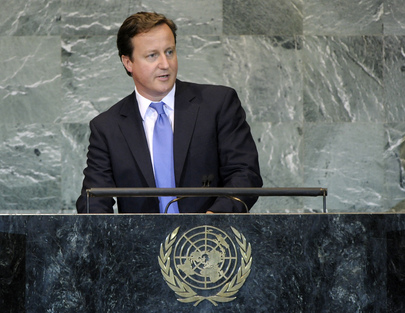
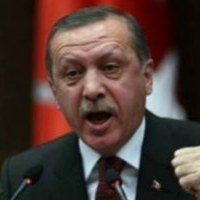
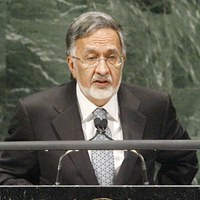

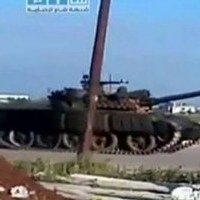
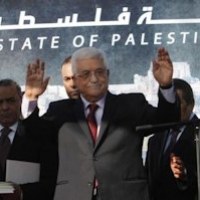




PM David Cameron Addresses the General Debate of the 66th Session of the General Assembly | Middle E http://t.co/updS2c9x
http://t.co/cLs3eoCt PM David Cameron Addresses the General Debate of the 66th …
PM David Cameron Addresses the General Debate of the 66th Session of the General Assembly | Middle E http://t.co/updS2c9x